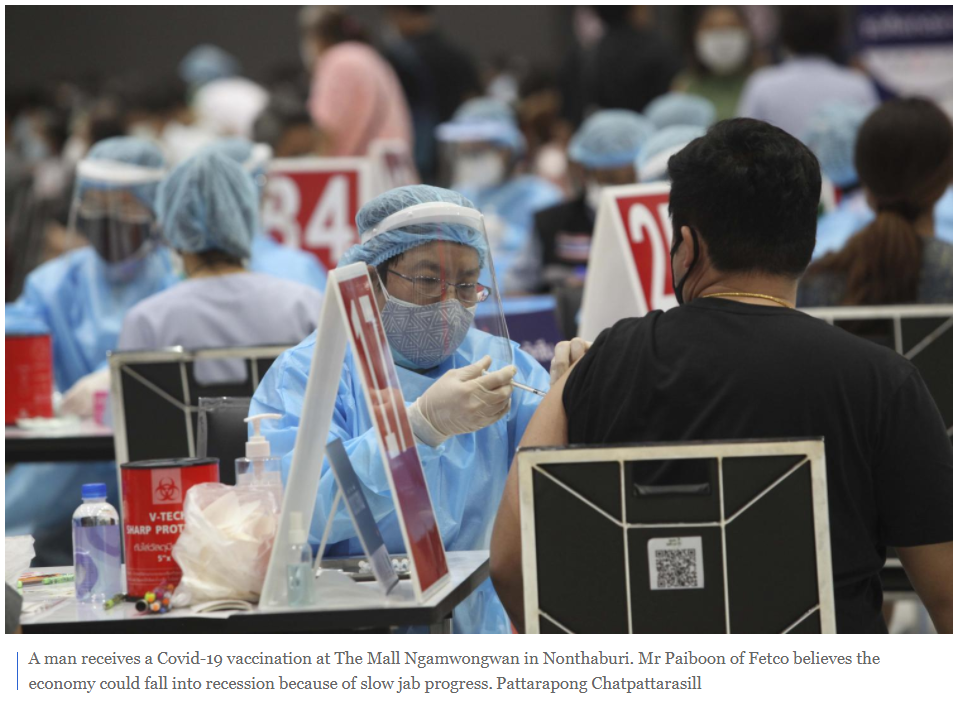Thailand: Fetco warns of recession, urges action
Paiboon Nalinthrangkurn, chairman of the Federation of Thai Capital Market Organizations (Fetco), has urged the government to accelerate economic stimulus and temporarily raise the public debt ceiling to 70-75% of GDP, or borrow an additional 800 billion to 1 trillion baht to help the country weather the pandemic.
He said the Thai economy could slip back into recession because of the government’s failure to achieve its vaccination target and herd immunity by this year as expected.
The economic risk of the pandemic will remain until the majority of the population has been vaccinated, Mr Paiboon said.
Without herd immunity, the coun- try’s planned reopening in October may fail and the current lockdown may not be the last, he said.
“If the government fails to contain the outbreak within a month, the lockdown may be extended through August,” said Mr Paiboon.
“The Thai economy has a high chance of falling back into a recession. Thailand will become one of a few countries whose economy will be in a slump while others recover. This would mark the first time since the Tom Yum Kung financial crisis in 1997 that the Thai economy is in a recession for two consecutive years.”
He said the main factors delaying economic recovery were slow vaccine procurement, ineffective pandemic control measures, inadequate economic stimulus packages from the government, and emphasis on reactive rather than proactive measures.
“It’s good the government is trying to maintain fiscal discipline by avoiding raising the public debt-to-GDP ratio beyond the recommended ceiling of 60%,” said Mr Paiboon.
“However, in times of crisis when purchasing power is dwindling, people lack income and small and medium-sized enterprises are going bankrupt, fiscal discipline should be eased to help the economy recover as quickly as possible.”
The measures to stimulate the economy must be effective and applicable. The budget must be adequate and distributed promptly, he said.
Countries that have succeeded in turning their economies around such as the US have used this approach to restore the economy.
Despite declines in other sectors, Thailand is fortunate to have a strong export segment to sustain the economy and prevent too deep a slump, said Mr Paiboon.
However, if infections among factory workers keep rising, exports may be at risk of a slowdown, depriving the Thai economy of a supporting pillar during a wobbly period, he said.
Mr Paiboon suggested for the rest of the year, the government should expedite spending of the remainder of the 1-trillion-baht loan from the Royal Decree, and inject 500 billion baht from the Loan Act into the economy through additional stimulus measures.
The new measures should focus on easing employers’ burden in paying wages and increasing consumer purchasing power.
“Looking forward, additional government stimulus packages will remain a staple of recovery plans for some time,” he said.
“Even after 70% of the population has been vaccinated, the tourism and service sectors, which are integral parts of the Thai economy, are likely to take at least two years to return to normal.”
Mr Paiboon said the government needs to act by temporarily raising the public debt-to-GDP ceiling to 70%-75% to accommodate the rollout of a fiscal policy and borrowing an additional 800 billion baht to 1 trillion baht to help the economy survive the prolonged pandemic.
New stimulus measures may be necessary, he said.
“Accelerating the procurement of high-quality vaccines is certainly the most important supporting factor for the economic recovery,” said Mr Paiboon.
“However, the use of fiscal policy is equally essential to help the Thai economy recover as soon as possible.”
Source: https://www.bangkokpost.com/business/2153435/fetco-warns-of-recession-urges-action


 Thailand
Thailand




